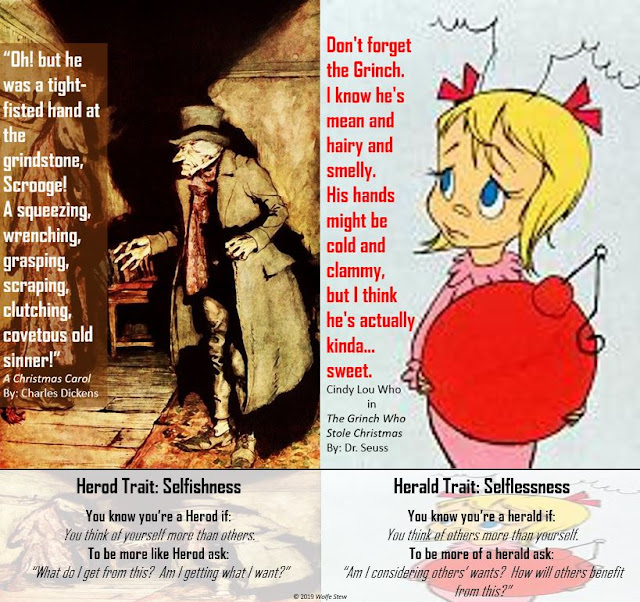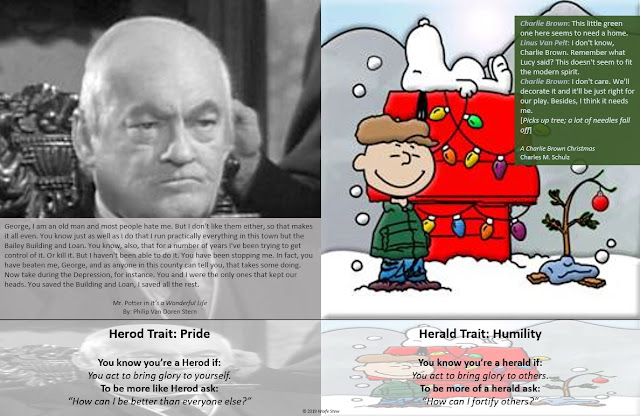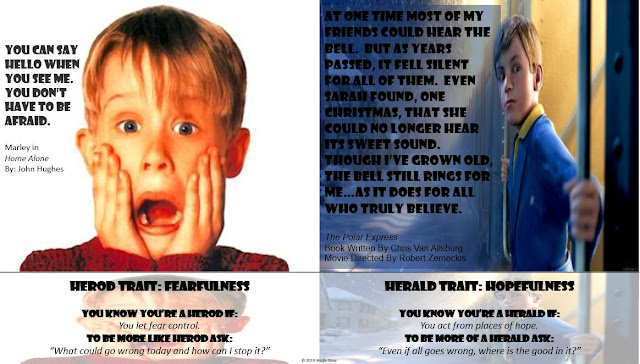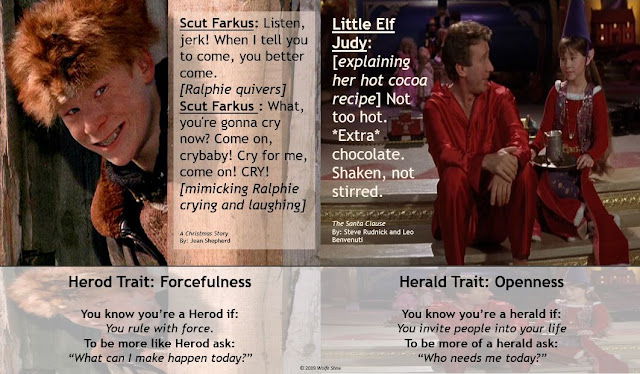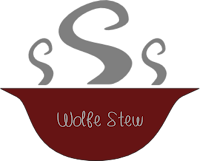Are You a Herod or a Herald?
(Updated 12/1/2022)
Welcome back, friends!
I am thankful that you are here today.
In a previous blog post, “Christmas Time is Here,” I mentioned
that we, as Christians, assume the herald role. We are to proclaim and pave the way for others to walk the path to meet
our King. As I considered this role,
another question emerged. One that
initially seems simple, yet quickly deepens in complexity:
This Christmas season, are you acting as a Herod or a herald?
You’re already answering: “Of course I’m a herald.” Done. Click away. What blog post am I
reading next?
But WAIT!
There's more!
There's more!
What if the answer is not that simple? What if you are showing Herod traits without even
realizing it? Maybe the process of
acting out your role as herald is morphing you into a Herod.
The Format
To compare Herod and herald, we’ll institute a side-by-side
approach. Character trait by character
trait. This is how we’ll do it:
- Identify comparable traits of each persona supported by descriptors.
- Connect each trait with compatible Christmas characters.
- Provide a “You know you’re a Herod/herald if…” statement
- Suggest ways to get from one to the other.
Let the analysis commence.
First Herod Trait – Selfishness
A Herod is cleverly selfish. Named, “King of the Jews,” by Marc Anthony, Herod claimed allegiance to him when conflict with Octavian arose. However, he conveniently switched, dropping any illusion of loyalty,
right at the end. This last-minute
switch secured his title.
A title which the Bible depicts Herod fighting to retain. “Wisemen,” Herod connives, “Go to Bethlehem. Search diligently for this ‘King of the Jews,’ and when you find him, tell me where, so that I too may come and worship him.” (My very loosely and slightly opinionated translation of Matthew 2:8.) Herod desired the “King of the Jews’” location so he could kill the threat to his throne. No other would bear his title.
In each instance, Herod cleverly fought for personal gain. Have you done this? Have you fought for personal gain this season? I’d wager if you haven’t, you’re not human. We are selfish by nature and tend to initially act in favor of our own interests.
First Herald Trait – Selflessness
Heralds, alternately, are selfless. Actions toward personal advancement are
contradictory to their purpose because heralds strive to advance the personal gain of
whom they serve. Heralds propel others
toward their master and remove obstacles that detract from this goal.
I bet you’ve been a herald, choosing to do something for someone else’s benefit. You stay up late packing your kid’s lunch, despite your exhaustion. You watch the movie your spouse wants to watch, even though you can’t remember the last time you chose. You sing your workmate's praise, even when the favor is not returned.
Herod was prideful. He had a whole mountain moved just so he could have a better vantage
point. His inner dialogue likely
resounded as such: “My castle must be higher than anyone else’s
castle. My castle must have the
best views. From within my
luxurious castle, I will send messages using mirrors. No need of a herald for me.”
I wonder if your inner dialogue ever sounds this way - full of “my’s”. I know mine does. “My dinner last night was better.” “My phrasing flows more smoothly.” “My reasoning is more logical.” It’s easy to get a case of the “my’s,” and it’s easy to feel justified in having them. Perhaps, at times, it is true: within all of us lies the propensity for greatness.
Second Herald Trait – Humility
But heralds are humble. A herald, even great ones, stands in the shadows. Mountains move, but to remove obstacles, not
to reside within them. Willingly, the
herald grabs a shovel and starts scooping the dirt. Joyfully, because a herald understands the
end goal. The herald moves the mountain
to clear the path to his king – so others may know him too. A herald does the hard work, the humbling work,
because of the reasoning behind it: to bring glory to his king.
Doubtless, humility resides in you. Laundry, folded and put away, ushers in tranquility. Old clothes, worn with gratitude, permit calm in finances. Compliments, spoken in earnest, breathe life into others.
Herod was fearful. Motivated by rumors of conspiracy, he murdered multiple family members. Herod lived in insecurity. Distrustful and jealous, Herod questioned
everyone around him. Never knowing
peace, Herod - though powerful - was truly powerless. Fear ruled him.
Oh, friends. Fear, a controlling factor in my life also, is nothing to dismiss. “Do not fear!” The Bible commands countless times. So easy to say; so hard to do. It creeps into every corner of our life. Whispers to us in the quiet. Awakens us in the middle of the night. Fear lives in your life too.
Third Herald Trait – Hopefulness
A herald, however, lives in hope. They believe when no one else believes. At the top of their lungs, they shout of a
king no one else sees, hears, or understands. Consider Noah. He built an ark,
foretold a flood and acted in obedience, all while labeled insane. Fast forward thousands of years, hear Peter
dubbing him, “a herald of righteousness.” (2
Peter 2:5)
Hope fills your life too. Likely it’s a motivating factor, answering the “why,” questions. Why am I in this relationship? Why am I working here? Why should I keep fighting?
Fourth Herod Trait – Forcefulness
To combat fear, Herod used force – killing all who
opposed: wives, mother-in-laws, brothers, babies. No pardons. Strong fear demanded strong force. Herod reigned. Fear him or face the consequences. To eradicate fear, Herod terminated
opposition. He would keep his throne, by
force.
Sometimes, the solution seems obvious. The room needs cleaning. You can make that happen. Trash bag in hand, voice at full volume, you stomp toward the door. “One way or another, it will be cleaned!” Often, forcefulness presents as the most direct approach to our problems.
Fourth Herald Trait – Openness
A herald offers. They
seek you, invite you, and genuinely desire your presence. Given a herald’s character, you’re likely to
accept. You see, heralds uphold
inviolable reputations; there is no reason for distrust. The response to an invitation from an
inviolable person is likely one of affirmation.
Hospitable. An adjective inseparable from your identity. Your dining room only lives when guests arrive. Planning perfect menus happens to top your nonexistent housewarming resume. Or perhaps, you’re the one who is always ready to offer a listening ear. In your own way, I imagine openness exists on your profile.
While, “King of the Jews,” Herod intensely craved affection
from his subjects. Acts would do
it: Restore Solomon’s temple beyond its
former glory. Check. Build a synagogue. Check. Remit taxes. Check. Distribute free grain. Check. Increase economic prosperity. Check. Expand the territory. Check. Fortify the city. Check. With all these acts accomplished, Herod still
failed to gain popularity with the Jews.
What do you do to get people to like you? Is this something for which you should strive? Should we work to get the attention of others? Should what others think of us factor into our self-perception?
Fifth Herald Trait – Deflects Attention
A herald seeks attention for his master. Soaking up attention directly negates the
herald’s role. A herald shines the light
on others, and if it lands on them, they deflect it back to their master. A herald knows it’s not about what they do,
it’s about on whom the spotlight shines.
Where does the spotlight shine in your life? Do you point it on yourself and your deeds, or on your Master? If ever you find yourself soaking up the warm light, do you deflect it back to your King? Do you focus on the who you serve instead of the what you do?
Herod, realizing his imminent death, rounded up a group of
influential Jews. The murdering of these
Jews upon his death would give those who remained a reason to mourn. Misery, after all, loves company as death
desires companionship.
Perhaps you too pull others into your misery. When miserable, it’s painful to see others around us happy. It’s at times like these, deep in despair, that we lash out at others. We say and do things we don’t mean. We speak words and act in ways that bring death. Death to openness. Death to hopefulness. Death to selflessness.
Sixth Herald Trait – Harbinger of Life
The herald from the Bible story brought news of life. Of life that changed history. Of life that flipped even the Bible upside
down. Rules changed. Hope reigned for all because of a child, born
in a manger, named Jesus. Here. With us. A herald that serves the Lord is to call all to, “Taste and see that the
Lord is good,” (Psalm
34:8). To invite all to the One who is life.
This is you, friends. You shine your light from the hilltop on the one who is life. You desire all to, “taste and see that the Lord is good.” You work at removing obstacles that hinder those around you from making their way to the Lord. We act as Harbingers of Life when we choose words and actions that bring life. We shine our light on the one who is life and transformation happens. Forcefulness to openness. Fearfulness to hopefulness. Selfishness to selflessness.
Herod and heralds share commonalities. Both played significant roles in the story of
Jesus’ birth. Both required people to
listen to them. In fact, while a herald
is a person who proclaims, Herod’s name means, “Song of a Hero,” or “Ode to a
Warrior.” Both require people to hear.
Honestly, I see myself in both roles across every comparison. Sometimes I am a Herod but other times a herald. I’d argue most people are. I’d like to see in myself more herald qualities. I’d like to learn to lessen the Herod tendencies. I think I found the way to work toward that goal.
The truth hides in the words. Herod and herald, common in spelling, differ mainly with the “l.” The prominent sound difference being the final “ald,” instead of “od.” To change from a Herod to a herald requires letting in the “l”ife. And there you have it: life makes all the difference.
Jesus answered, “I am the way, the truth, and the life." John 14:6
This season and every day thereafter, won’t you consider
joining me to work toward making this transformation by letting in The Life? Then, as heralds, together we can, “go up on
a high mountain, lift our voice and shout without fear:
'Behold Your God!'"
Isaiah 40:9
With Love and Life,
Interested in more faith-related blogs? Then you're looking for Faith Food. At Faith Food, you'll find links to all our faith-related blogs and a short description of each.
All pictures provided through creative commons licenses. Those requiring attribution with license links mentioned here:
- The Cindy Lou Who, Charlie Brown, boy from Polar Express, Scut Furkus and Tiny Tim pictures are licensed as CC BY-NC-ND.
- The Mr Potter, Santa Clause and conductor pictures are licensed as CC BY-SA.
- The Kevin McCallister and Grinch pictures are licensed as CC BY-ND.
Research resources include:
- Encountering Herod https://engediresourcecenter.com/2015/07/03/encountering-herod/
- Herod the Great https://en.wikipedia.org/wiki/Herod_the_Great
